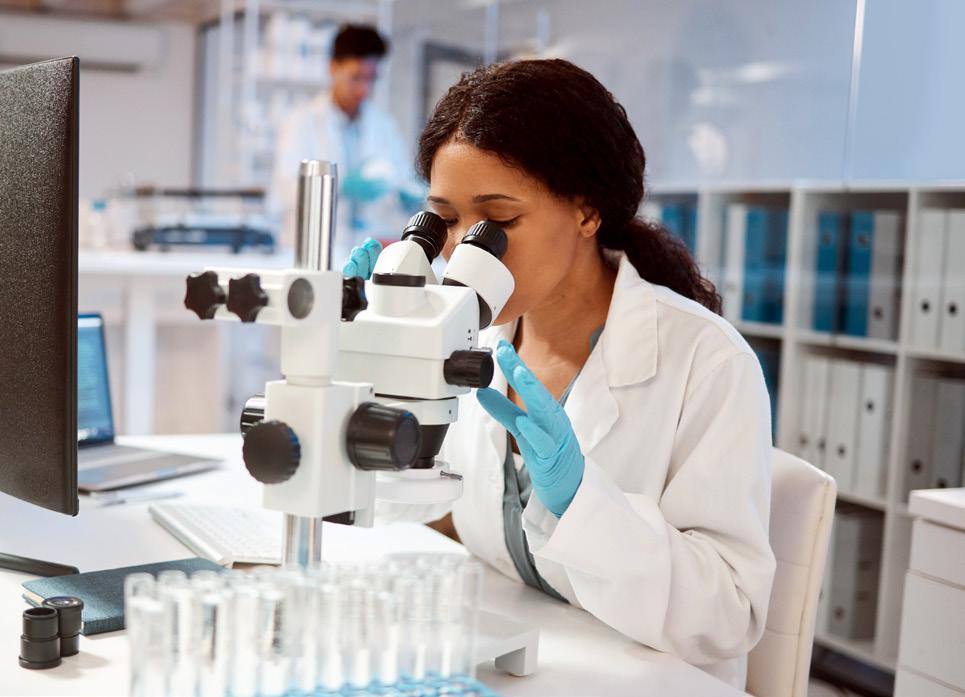Master of Science in cytology
Advance your career as a cytologist in the first program of its kind in Arizona. Cytology plays a vital role in medical diagnostics, research and understanding of cellular processes. In our flexible online master’s program in cytology, you will study cells through the perspective of structure, role, biochemistry, communication and behavior.
You will build skills and knowledge by making diagnoses using microscopic cellular findings, patient histories and applicable companion testing results. The curriculum includes didactic cytology courses, advanced diagnostic technologies in molecular diagnostics, immunohistochemical biomarkers and digital pathology. Through virtual labs, lively discussions and coursework, you will gain knowledge in anatomy, pathophysiology, histology and cytopathology across every organ system.
Gain additional experience through a clinical practicum and prepare for professional certification. Get ready to advance health care with an innovative master’s degree in cytology.
Improve health outcomes through less-invasive testing and early diagnosis.
$88k
Median salary for cytologists in the U.S. in 2024 Salary.com (Cytologists were formerly known as cytotechnologists.)
The College of Health Solutions at Arizona State University translates scientific health research and discovery into practice. Its programs prepare students to address the challenges facing our populations to stay healthy, improve their health, and manage chronic disease — all toward improving health outcomes.
Master of Science in cytology curriculum
Learning on the student’s schedule, get hands-on training through an in-person course practicum and prepare for a meaningful and impactful career in cytology with innovative, interactive classes on a wide range of topics.
Featured courses
BMD 570 General Principles of Cytology and Pathology
Explore the fields of cytology and pathology through the historical development and significance in diagnostics. Examine cell structure and function, cellular pathology and common cytological stains and techniques. Develop skills in evaluating and interpreting cytological samples, applying laboratory techniques, and understanding professionalism and ethics in cytology.
BMD 571 Microscopic Evaluation
Gain practice in microscopy principles and techniques, such as microscopic operation, maintenance and troubleshooting. Gain an introduction to the different organ systems distinguishing between normal and abnormal structures. Use digital cytology to screen patient cases. Learn about accurate diagnostic reporting through an introduction to reporting systems used in cytology practice.
BMD 572 Laboratory Operations and Preparation
Learn the fundamentals of cytology lab operations, including lab components, workflow and safety protocols. Learn sample collection and preparation, quality control, and to use Laboratory Information Management Systems. Develop problem-solving strategies and effective communication skills in lab settings.
BMD 601 Fine Needle Aspiration Cytology
Discover the principles and techniques of fine needle aspiration, including indications, advantages and limitations. Become skilled in sample preparation, staining and evaluation for diagnostic purposes. Likewise learn about rapid on-site evaluation, preparation of cell blocks and recognizing pathologies for diagnostic purposes.
Practicum experience
An in-person practicum allows you to gain experience within a clinical laboratory under the guidance of an approved supervisor. You can select your own practicum site (often within your place of employment) to ensure convenience and relevance for your learning experience. This field-based experience of the practicum will take you to the next level in your cytology learning journey through active, hands-on experience where theory meets practice.
Certification
Pending program accreditation, graduates will be eligible to take the American Society for Clinical Pathology Board of Certification examination to become a certified cytologist. Graduates may need to complete additional requirements based on the licensure requirements of the state in which they plan to work. See the ASU licensure website at admission.asu.edu/academics/licensure for more information.


